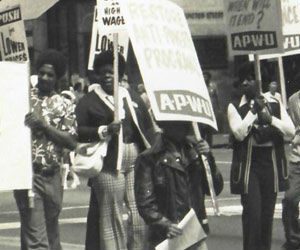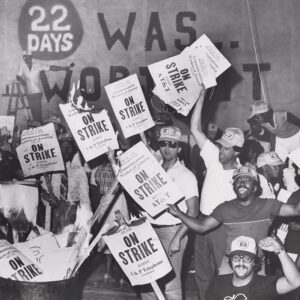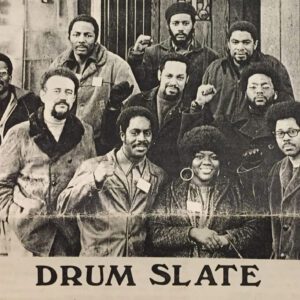April 30, 2006
Joe Hill: Labor’s Legendary Troubadour
(This article was first published in the May/June 2006 issue of The American Postal Worker magazine.)
At sunrise on Nov. 19, 1915, a firing squad at the Utah State Penitentiary executed a labor activist who many people believed had been falsely convicted of murder.
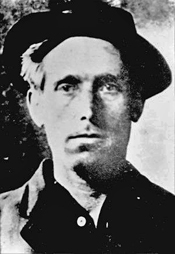 Nearly a century later, the legend of “Joe Hill” is frequently invoked in the ongoing struggle for social and economic justice. You may have heard his name in a folk song or at a labor rally – here is the rest of his story.
Nearly a century later, the legend of “Joe Hill” is frequently invoked in the ongoing struggle for social and economic justice. You may have heard his name in a folk song or at a labor rally – here is the rest of his story.
Life hadn’t been easy for Joel Emmanuel Haaglund, who in 1902 at age 22 left Sweden to find a better life in America. His father and two of his seven siblings had died by the time he was 8, and by age 9 he had already held a job himself, in a rope factory. At age 12, he moved to Stockholm to be treated for tuberculosis and picked up his only formal education, at a YMCA. There he learned to speak English and developed his talent for music and writing.
Haaglund arrived penniless at Ellis Island and quickly learned that life was hard for working people in America in the early 20th Century. After a stint cleaning bar spittoons, he left New York and began his life as an itinerant laborer.
In his early life on the road, Haaglund worked as a miner, a fruit picker, and a logger. In 1906, a Swedish newspaper printed his eyewitness report of the devastating San Francisco earthquake, and by 1910, he was going by the name Joseph Hillstrom. His friends claimed that he did so because he had become a marked man for speaking out for unions in West Coast company towns, but his detractors said that he had resorted to petty crime, and had changed his name to evade the law.
‘One Big Union’
By 1910, the 30-year old Hillstrom had grown increasingly disgusted with a corrupt system that held poor families captive to low-paying, thankless jobs in service of the wealthy and powerful. While working on the docks near Los Angeles that year, he joined the International Workers of the World (IWW), a militant band of union activists that welcomed women and minorities into its ranks and aimed to unite all workers in “One Big Union.”
Many labor activists were convinced that the unchecked greed of the Gilded Age was crushing the American Dream for most working people, and the Wobblies, as the IWW was known, rapidly grew in strength. Hillstrom became an organizer and adopted Joe Hill as a pen name, writing letters and songs to aid the union cause.
Joe Hill’s words and music were an inspiration to labor activists, and he was reported to be on the front lines of virtually every IWW job action during its heyday. Whatever his whereabouts, Joe Hill was a daring troubadour for labor at a time when bosses got away with hiring scabs, thugs, and crooked cops in the violent repression of union activity. Between 1911 and 1913, he wrote dozens of songs that helped communicate the IWW’s message, including “The Preacher and the Slave” (1911), in which he coined the term “pie in the sky;” “Casey Jones — The Union Scab”(1912); and “There is Power in a Union” (1913).
Arrested in Utah
By 1913, when Hill’s union activities had left him unable to find work in California, he hit the road again, ending up in Utah, a state very hostile to unions. On Jan. 10, 1914, a former policeman, J.B. Morrison, was shot dead in a gunfight with two assailants in his Salt Lake City grocery store. On that same evening, Hill visited a doctor for treatment for a bullet wound, the result, he later said, of an unrelated quarrel over a woman.
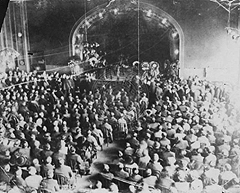 Though Hill had never met Morrison, who long had feared a revenge attack from people he had arrested, Hill was charged with the murder. None of Hill’s blood — nor the bullet that passed through his chest — was found at the scene. Four other men had been treated for bullet wounds in the area that evening, and forensic evidence supported Hill’s claim that he had been shot not during a gun battle, but while holding his hands over his head.
Though Hill had never met Morrison, who long had feared a revenge attack from people he had arrested, Hill was charged with the murder. None of Hill’s blood — nor the bullet that passed through his chest — was found at the scene. Four other men had been treated for bullet wounds in the area that evening, and forensic evidence supported Hill’s claim that he had been shot not during a gun battle, but while holding his hands over his head.
Hill could not afford his own lawyers and believed that his state-appointed attorneys were acting in collusion with his prosecutors. Yet for reasons unknown, he declined to testify in his own defense. Some say he feared cross-examination or simply believed that the state had not proved its case. Others believe that he was a man of honor who risked conviction rather than tarnish a woman’s reputation. Still others felt that he knew the world was watching and chose to become a martyr for the union cause.
The controversial trial that condemned Hill to death on questionable evidence rallied unionists and others around the world to petition Utah governor William Spry to release Hill or grant him a new trial. Hundreds of thousands of union members from Europe to Australia wrote letters to Spry, as did President Woodrow Wilson, the Swedish ambassador, the daughter of a prominent Mormon Church leader, and Helen Keller. But Spry — who had promised to rid the state of “IWW agitators, or whatever they call themselves” — refused to release Hill and told the president and the Swedish government he would grant a new trial only if they could produce evidence of Hill’s innocence.
In the 22 months between his arrest and execution, Hill wrote many letters, poems and songs, including such well known lines as:Workers of the world, awaken! Break your chains. Demand your rights. All the wealth you make is taken, by exploiting parasites… For united we are standing, but divided we will fall. Let this be our understanding: “All for one and one for all.’’
Approximately 30,000 mourners lined the streets for Hill’s funeral procession in Chicago, and at his request, his ashes were distributed to IWW locals in every state but Utah.
The Legend Endures
Hill’s last message to unionists from his Death Row cell concluded with: “Don’t mourn for me. Organize!” A decade later, the poet Albert Hayes wrote the words what would become a union anthem:
I dreamed I saw Joe Hill last night, Alive as you and me. Says I, “But Joe, you’re 10 years dead.” “I never died,” said he. …
“The copper bosses killed you Joe, they shot you Joe”” says I. “Takes more than guns to kill a man,” says Joe, “I didn’t die…What they can never kill went on to organize…
From San Diego up to Maine, in every mine and mill, where working-men defend their rights, it’s there you find Joe Hill.”
The poem was set to music in 1936, and was popularized in recordings by Paul Robeson, Pete Seeger, and Joan Baez, whose performance of “Joe Hill” at Woodstock in 1969 helped revive the legend for a new generation.
Workers of the World, Awaken!
Workers of the world, awaken!
Break your chains.
Demand your rights.
All the wealth you make is taken
By exploiting parasites…
Join the union, fellow workers,
Men and women,
Side but side;
We will crush the greedy shirkers
Like a sweeping, surging tide.
For united we are standing,
But divided
We will fall;
Let this be our understanding —
All for one and one for all.

